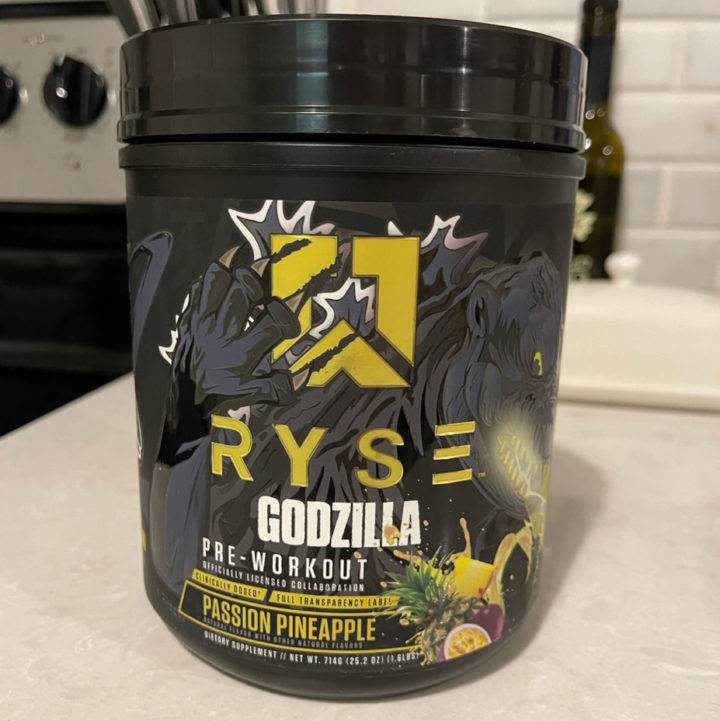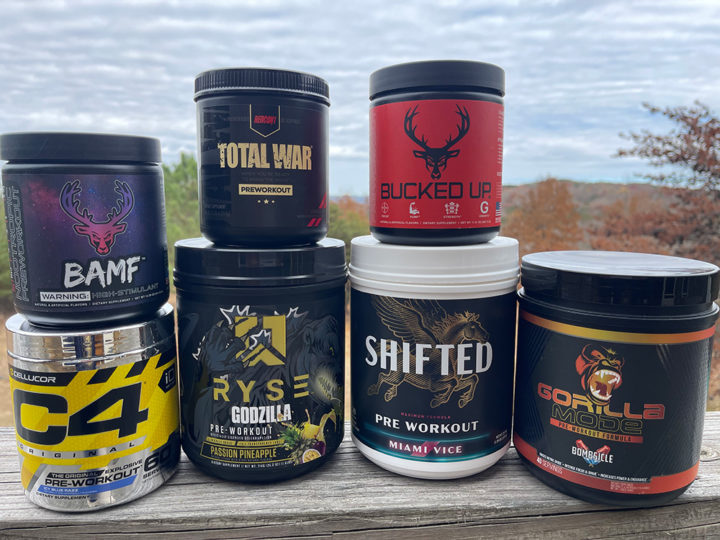Welcome to Pre-Workout World. Our goal is to demystify the ingredients in pre-workout supplements and help you understand exactly what you’re putting into your body.
Our 3 Favorite Pre-Workouts
- Shifted Maximum Pre-Workout (Best Overall)
- Transparent Labs BULK Pre-Workout (Best for Bulking)
- Kaged Pre-Kaged Sports (Best for Sports)

Our Latest reviews
Our Goals For Pre-Workout World
Our main goal with Pre-Workout World is to demystify the multi-ingredient pre-workout supplement.
We are going to tell you exactly what the science is behind every pre-workout ingredient on the market. From the good stuff (L-Citrulline, Beta-Alanine, etc) to the less proven stuff.
When you’re done with our website you’ll not only know which ingredients to be looking for in your pre-workout, but how much of each ingredient.
How To Pick A Good Pre-Workout
There are an enormous number of pre-workouts on the market. So how do you pick a good one? It really comes down to what you’re looking for.
For example, maybe you’re a Jiu Jitsu athlete or a runner and you want a low stimulant pre-workout to give you a little extra endurance. Then you’d pick a pre-workout with good endurance ingredients and a lower stimulant dosage.
Maybe you are an older person who cares about maintaining muscle mass and preventing sarcopenia. Then you’d choose a pre-workout with good blood flow, muscle supporting and energy ingredients. Creatine, Citrulline and Caffeine are the three key ingredients for older folks.
Or maybe you’re a gym rat who wants the killer pump. Then you’re looking for ingredients that increase blood flow and muscular hydration. Think L-Citrulline, nitrates and glycerol.
Maybe you’re just a general fitness enthusiast who does Crossfit. Or you get a thrill out obstacle course racing. Then you’re looking for a good mid-level pre-workout that hits all the sweet spots without going over the edge.
Or maybe you play video games and just want the extra energy and focus that you get from a good nootropic-centered pre-workout.
Maybe you’re a stimulant junkie and love the high you get from pre-workout: then you may want to get the most caffeinated pre-workout you can tolerate.
Or maybe you don’t want any caffeine at all. Because you work out at night. Well, then you’re looking for a stimulant-free pre-workout.
There are so many options. So let’s discuss some of the big ingredients and pre-workout functions to look for.
The Basics Of Preworkout
So what exactly is a pre-workout? Seems like an easy question but there are a lot of different kinds of pre-workout and different ingredient profiles.
As a first stab at a definition, let’s say a pre-workout is a multi-ingredient supplement designed to help you get more out of your workouts. But different companies take different approaches to this. So let’s list out some of the purposes of a pre-workout. A good pre-workout should give you:
- More energy
- More endurance
- More blood flow
- More strength
- More power
- More focus and attention
- Less fatigue
- Less pain
- Better recovery
That’s a preliminary list. And not all pre-workout supplements give you all those features. Some pre-workouts only focus on energy. Some focus on energy plus endurance. Others try to tick all the boxes.
Let’s dig deeper by looking at the key pre-workout ingredients for each of these goals.
Energy Ingredients
The big ingredient for energy is of course caffeine. And supplement companies know that. Your lower-cost pre-workouts are usually just glorified caffeine. Caffeine is the most powerfully felt ingredient in a pre-workout and the ingredient that most people are after. But it is not the only effective.
While some companies throw in additional energy ingredients (like theobromine) to differentiate themselves. The king of energy is caffeine and that’s not going to change any time soon.
Endurance Ingredients
The big endurance ingredients to look for in a pre-workout are Beta-Alanine and L-Citrulline. Any ingredient that allows you to go harder for longer is considered an endurance ingredient. As you will see, some ingredients play multiple roles (for example, L-Citrulline also increases blood flow)
Beta-Alanine
Beta-alanine helps with endurance by reducing perceptions of fatigue and pain. It does this when the body converts it to carnosine to buffer against the onset of lactic acid. You want a dose of 2-5g of Beta-Alanine to get clinically effective results. Some people even swear by taking 8-10g over a day. Less than 2g and you shouldn’t expect much.
L-Citrulline
L-Citrulline increases endurance by improving blood flow which allows muscles to recover faster during a workout. You want a dose of 4-10g with the sweet spot being 6-8g for most people.
Blood Flow / Pump Ingredients
The two big types of blood flow ingredients are Arginine pre-cursors (L-Citrulline) and Nitrates (often found in leafy vegetables like beetroot and red spinach).
The arginine Nitric Oxide pathway and the nitrate Nitric Oxide pathway are different and thought to be complementary so stacking these ingredients can improve and extend blood flow.
L-Citrulline
As stated above in the section on endurance, the optimal dose of L-Citrulline is about 6-8g. This helps promote optimal blood flow to the working muscles.
While the minimum effective dose of L-Citrulline is suggested to be ~3 grams, citrulline has show to positively impact L-arginine bioavailability and nitric oxide signaling in a dose-dependent manner up to 10-15 grams. Therefore, a higher dose can further promote better blood flow to the working muscles.
Nitrates
Nitrates such as those found in beetroot and red spinach help with nitric oxide production via the nitrate pathway. They do this by increasing intramuscular stores of nitrate, signaling a nitric oxide boost which in turn increases blood flow to the muscles and increases muscular performance. The optimal dose for nitrates seems to be 1-2g.
Pre-workouts that have both nitric oxide pathways are superior to pre-workouts with only one.
Strength Ingredients
The two most well known ingredients for increasing strength are Creatine and Betaine.
Creatine Monohydrate
Creatine monohydrate is the most well-studied and thought to be the most effective form of creatine available. While not all pre-workouts have creatine, evidence increasingly shows that topping off your creatine stores before a workout pays dividends.
Creatine is the single most effective long-term workout supplement you can take. And taking it in your pre workout helps to make sure your creatine levels are topped off.
Creatine works by facilitating rapid energy regeneration during exercise, particularly during bursts of high-intensity performance. This allows you to exert more strength over longer periods.
The ideal dose for creatine in a pre-workout is 2-5 grams. The ideal daily dose for creatine supplementation is anywhere from 5-15 grams. Recent research suggests that the benefits continue well beyond 5 grams.
Betaine Anhydrous
Betaine helps to maintain fluid balance and increase muscular hydration. It also enhances the body’s synthesis of creatine and is therefore good to take in combination with creatine in a pre-workout.
While not as potent as creatine, Betaine has been shown to increase markers of strength and power.
Focus Ingredients
Ingredients that help you focus are called nootropics. Here are a few of the more common pre-workout nootropics:
Choline (as Alpha GPC or Citicoline)
Choline allows the body to create acetylcholine which is a neurotransmitter in the brain that helps stimulate muscle contractions. By supplementing with a form of choline, you get heightened alertness, attention, and working memory in addition to other performance-enhancing benefits.
L-Tyrosine
Tyrosine is an amino acid that the body uses to produce the neurotransmitters dopamine and norepinephrine. Supplementing with L-Tyrosine prevents deficits in mood, attention, and cognition during exercise. L-Tyrosine helps you keep focused in stressful situations.
The Problem of Underdosing
It’s not enough for a pre-workout supplement to contain an ingredient. It needs to contain a clinically effective dose of each ingredient. Unfortunately, many pre-workout companies cut corners and will deceptively sprinkle in a small amount of an ingredient which will not help because it is underdosed.
An example: 100mg of Taurine is not going to make a big difference in a human body. 1-3g is the clinically effective dose that has been scientifically established.
When evaluating a pre-workout, don’t just look at the ingredients. Look at the ingredients and their dosages.
